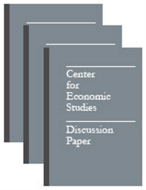The Long-Run Effects of Recessions on Education and Income
The Long-Run Effects of Recessions on Education and Income
Abstract
This paper examines the long-run effects of the 1980-1982 recession on education and income. Using confidential Census data, I estimate generalized difference-in-differences regressions that exploit variation across counties in the severity of the recession and across cohorts in age at the time of the recession. I find that children born in counties with a more severe recession are less likely to obtain a college degree and, as adults, earn less income and experience higher poverty rates. The negative effects on college graduation are most severe and essentially constant for individuals age 0-13 in 1979, suggesting that the underlying mechanisms are a decline in childhood human capital or a long-term decline in parental resources to pay for college. I find little evidence that states with more generous or more progressive transfer systems mitigated these long-run effects. The magnitude of my estimates and the large number of affected individuals suggest that the 1980-1982 recession depresses aggregate economic output today.




